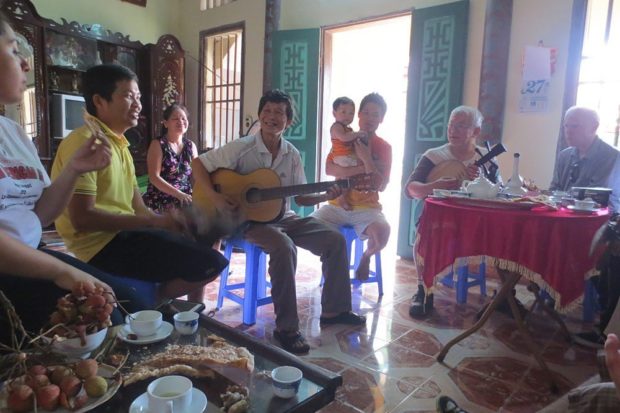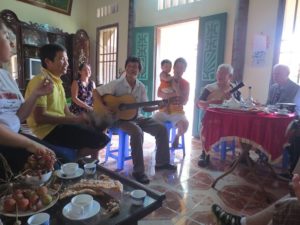
By Gerry Bill

It wasn’t exactly tea with Mussolini, but perhaps it was something like that. During a recent trip to Vietnam, my first, I was fortunate to be with a small group that got invited to the home of a former Viet Cong (VC) fighter from the 1970s. His name, appropriately enough, is Mr. Viet, and he lives in the Tho Ha village, a small place about two hours out of Hanoi.
It was an experience to remember. When I met this sweet and humble man, it was hard to picture him as one of the vicious Viet Cong that I had heard about through the U.S. media in the 1960s and 1970s. He is a small man, slight of stature, not really big enough to be a threat to anyone it would seem. But more than anything else, it was his graciousness and pleasant disposition that were in such stark contrast to the media images of the past.
His house was not large by U.S. standards, but it was one of the larger houses in the village. It had been in his family for a long time, and there were pictures and other reminders of his ancestors on the walls. When we arrived, he sat us down and immediately offered us some of his homemade rice wine, of which he is justly proud. That was followed by a locally produced large cracker bread that was passed around the table as we each broke off a piece to eat. It wasn’t supposed to be a meal, but he also provided us with Vietnamese green tea, peanuts and lychee fruit.
Mr. Viet makes his living, together with his wife, by producing the rice paper used to wrap spring rolls in Vietnam. It is a cottage industry in Tho Ha, and the rice paper production is done right there in the home using centuries-old techniques. In addition, Mr. Viet is an amateur musician, the leader of a small music group in the village. He played us a couple of songs on some traditional Vietnamese folk instruments, singing as well. He finished his set with a surprise song—the famous Cuban folksong, “Guantanamera,” sung in Spanish, of course. He is a man of many talents.
I suppose our visit could be viewed as nothing more than a pleasant afternoon in a small village, but there was a lot more to it than that. Mr. Viet was quite happy to talk with us, his former enemies, as it were, about his Viet Cong days. He participated in the liberation of Saigon in April 1975. He was just 21 at the time and had been part of the VC fighting force for about three years. After the reunification of the country, he continued his military career for another five years, becoming part of the regular army until 1980.

We asked him many questions about the war years. He served in the region just outside of Saigon, now called Ho Chi Minh City, during the final years of the war. He said there were definitely times when he feared for his life, as many VC had been killed in that area.
Despite the fact that U.S. armed forces were the ones that had killed so many of his comrades and were trying to kill him, he seemed to bear no ill will toward the Americans. Maybe it was because his side won the war, or maybe he saw the soldiers on the other side as being very much like him—just ordinary men fighting for what they believed to be right.
Even though it was a war between the North and South of the country, Viet Cong today are honored in both the northern and southern portions of the once-divided state. They are seen as the main force that brought about reunification, which was a goal shared by a majority of residents on both sides of the artificial dividing line. The Vietnamese people did not want to be divided, and the Viet Cong are seen as the heroes who drove the occupying forces of the United States out of the country.
There are still both pro-communist and anti-communist sentiments within the population of the country, but the Viet Cong are somewhat removed from that controversy. They are not seen as ideologues, but as uniters, so to speak, and everyone, both pro-communist and anti-communist, looks up to them.
Mr. Viet certainly did not seem like an ideologue. He wasn’t interested in giving us any lectures on the merits of communism or socialism. He seems perfectly happy to live in a communist state, but it is not a cause célèbre for him. He is living out his life in a manner that pleases him, enjoying a position of some honor within his village, and enjoying playing music with his friends. And, yes, one more thing, he enjoys taking U.S. visitors into his home from time to time, playing and singing for them and telling them war stories.
During the war years, I was a conscientious objector and devoted a lot of energy to trying to bring about an end to that awful war. At the time, I did not really believe the U.S. propaganda about the dreaded Viet Cong, but at the same time I did not really have a good sense of who they were. I never dreamed that someday I would be sitting down for tea and bread with this supposed enemy of mine, witnessing the basic humanity of the man first hand.
About two weeks later, I was in the south of Vietnam and got to visit the famous, perhaps infamous, 150-mile network of tunnels that so effectively kept the VC beyond the reach of the U.S. soldiers. I got to crawl through two of the tunnels, and I saw how Mr. Viet’s slight stature worked to his advantage. The larger and heavier U.S. GIs would have great trouble getting through such a small space.
The tunnels were interesting to me but not nearly as interesting as my visit with Mr. Viet. Meeting my former “enemy” was the highlight of my trip to Southeast Asia. It opened my eyes and reminded me just how human most soldiers are, regardless of which side they happen to be on at the moment.
To me, it makes little sense for soldiers to work so hard at killing one another because in reality they are killing people much like themselves. I am glad that Mr. Viet was not among those killed in the conflict, and I feel lucky to have been able to sit down for tea and bread with him.
*****
Gerry Bill is emeritus professor of sociology and American studies at Fresno City College. He is on the boards of the Fresno Free College Foundation, Peace Fresno, the Fresno Center for Nonviolence and the Eco Village Project of Fresno, and is co-chair of the Central California Criminal Justice Committee. He was in Vietnam, Laos and Cambodia from May 21 through June 8 of this year.
